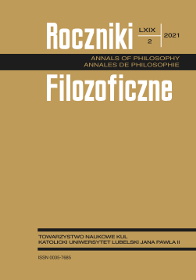Why Hope Cannot Be an Intellectual Virtue: Rationality of Hope Considered from an Analytic Perspective
Why Hope Cannot Be an Intellectual Virtue: Rationality of Hope Considered from an Analytic Perspective
Author(s): Elżbieta ŁukasiewiczSubject(s): Philosophy, Epistemology
Published by: Towarzystwo Naukowe KUL & Katolicki Uniwersytet Lubelski Jana Pawła II
Keywords: hope-that; hopefulness; intellectual virtue; rationality; propositional attitude; reliability; truth-conduciveness
Summary/Abstract: There are two aims of the paper. The first is to critically analyse the claim that hope can be regarded as an intellectual virtue, as proposed by Nancy E. Snow (2013) in her recent account of hope set within the project of regulative epistemology. The second aim is to explore the problem of rationality of hope. Section one of the paper explains two different interpretations of the key notion of hope and discusses certain features to be found in hope-that and hope-in. Section two addresses the question of whether hope could be interpreted as an intellectual virtue. To develop an argument against that view, a brief account of the notion of epistemic virtue is provided. Section three analyses the problem of rationality of hope and the parallels between rational belief and rational hope; the section focuses on what exactly makes a particular hope-that a rational and justified hope. Belief that p is possible/probable is part of the meaning of hope that p; therefore, it is assumed that rationality of hope cannot be considered in isolation from rationality of belief. It is argued that the “standard account” of the reasonableness of hope, which is found in the analytic literature, does not meet the standards of epistemic responsibility and needs rectifying.
Journal: Roczniki Filozoficzne
- Issue Year: 69/2021
- Issue No: 2
- Page Range: 5-37
- Page Count: 33
- Language: English

